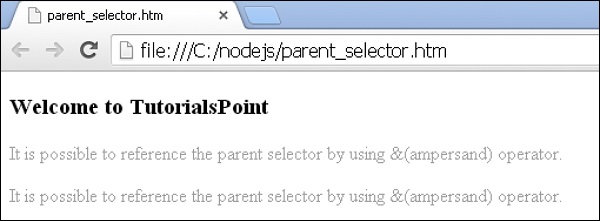
- Less - Nested Rules
- Less - Nested Directives and Bubbling
- Less - Operations
- Less - Escaping
- Less - Functions
- Less - Namespaces and Accessors
- Less - Scope
- Less - Comments
- Less - Importing
- Less - Variables
- Less - Extend
- Less - Mixins
- Less - Parametric Mixins
- Less - Mixins as Functions
- Less - Passing Rulesets to Mixins
- Less - Import Directives
- Less - Import Options
- Less - Mixin Guards
- Less - CSS Guards
- Less - Loops
- Less - Merge
- Less - Parent Selectors
- Functions
- Less - Misc Functions
- Less - String Functions
- Less - List Functions
- Less - Math Functions
- Less - Type Functions
- Less - Color Defination Functions
- Less - Color Channel Functions
- Less - Color Operation
- Less - Color Blending Functions
- Usage
- Less - Command Line Usage
- Using Less In The Browser
- Less - Browser support
- Less - Plugins
- Less - Programmatic Usage
- Less - Online Compilers
- Less - GUIs
- Less - Editors and Plugins
- Less - Third Party Compilers
- Less - Frameworks
- Less Useful Resources
- Less - Quick Guide
- Less - Cheatsheet
- Less - Useful Resources
- Less - Discussion
LESS - Multiple &
Description
The & will not just represent the nearest selector but also represents all the parent selectors.
Example
The following example demonstrates the use to & representing all the parent selectors in the LESS file −
parent_selector.htm
<html>
<head>
<link rel = "stylesheet" href = "multiple1.css" type = "text/css" />
</head>
<body>
<div class = "grand_parent">
<h3>Welcome to TutorialsPoint</h3>
<p class = "parent"> It is possible to reference the
parent selector by using &(ampersand) operator.</p>
<p class = "parent_class">It is possible to reference the
parent selector by using &(ampersand) operator.</p>
</div>
</body>
</html>
Next, create the style.less file.
style.less
.grand_parent {
.parent {
& > & {
color: #A9F5F2;
}
& & {
color: #D0FA58;
}
&& {
color: #81BEF7;
}
&, &_class {
color: #A4A4A4;
}
}
}
You can compile the style.less file to style.css by using the following command −
lessc style.less style.css
Execute the above command; it will create the style.css file automatically with the following code −
style.css
.grand_parent .parent > .grand_parent .parent {
color: #A9F5F2;
}
.grand_parent .parent .grand_parent .parent {
color: #D0FA58;
}
.grand_parent .parent.grand_parent .parent {
color: #81BEF7;
}
.grand_parent .parent,
.grand_parent .parent_class {
color: #A4A4A4;
}
Output
Follow these steps to see how the above code works −
Save the above html code in the parent_selector.htm file.
Open this HTML file in a browser, the following output will get displayed.

less_parent_selectors.htm
Advertisements